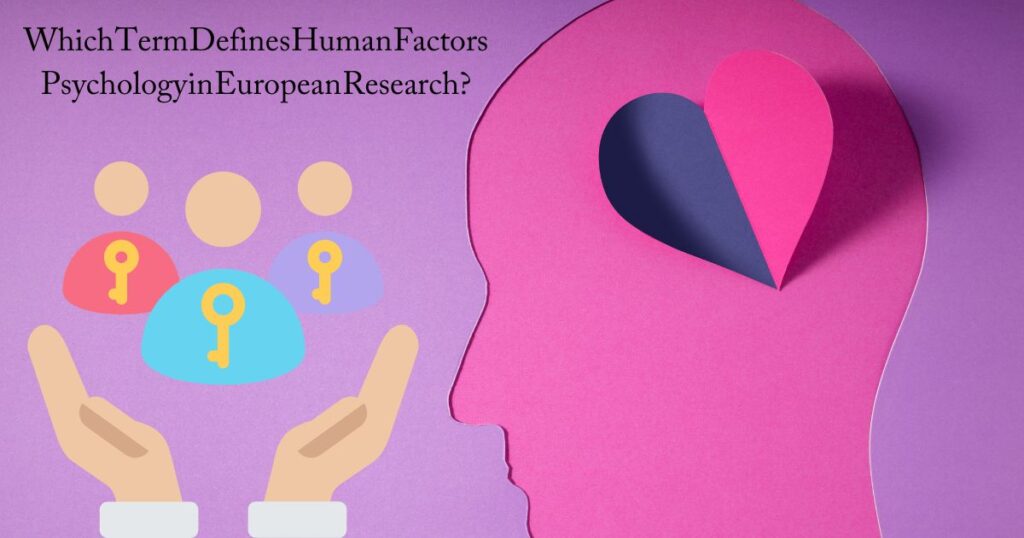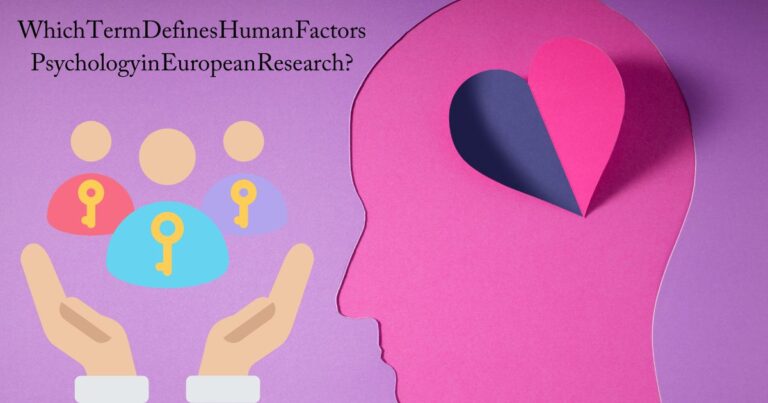Which Term Defines Human Factors Psychology in European Research?

Table of Contents
ToggleIntroduction
Human Factors Psychology, often referred to as ergonomics, has gained significant importance in Europe as industries strive to improve workplace efficiency and safety. However, the terminology used to describe this discipline varies across regions and academic circles.
Understanding the specific term preferred in European research is vital for global collaboration and scholarly discussions.
Defining Human Factors Psychology in Europe
In European research, ergonomics is the dominant term used to describe Human Factors Psychology. While in the United States, the term “Human Factors” is widely recognized, European academics and organizations often prefer “ergonomics,” derived from the Greek words ergon (work) and nomos (laws). This term emphasizes the systematic study of human performance in various environments, particularly workplace settings.
The International Ergonomics Association (IEA) defines ergonomics as the “scientific discipline concerned with the understanding of interactions among humans and other elements of a system.” This definition aligns closely with the scope of Human Factors Psychology, focusing on optimizing human well-being and overall system performance.
Historical Context of the Term “Ergonomics” in Europe
The use of “ergonomics” in Europe dates back to the mid-20th century. Polish scientist Wojciech Jastrzębowski is credited with coining the term in 1857, though its modern application emerged during World War II.
European researchers began adopting ergonomics to address challenges related to industrial efficiency and human-machine interaction. Over time, the term became synonymous with studies integrating psychology, physiology, and engineering.
Why Do Europeans Prefer “Ergonomics”?

Why Do Europeans Prefer “Ergonomics”?
The preference for “ergonomics” in Europe is rooted in cultural and linguistic factors:
- Standardization Across Disciplines:
Ergonomics is often seen as a multidisciplinary field that bridges psychology, design, and engineering. Using a single term helps unify the efforts of various professionals. - Alignment with European Standards:
Organizations such as the European Agency for Safety and Health at Work (EU-OSHA) frequently use ergonomics to promote workplace safety and efficiency, further solidifying its use. - Academic Tradition:
European universities and research institutions have long used “ergonomics” in their publications and curricula, making it the de facto term.
Key Applications of Ergonomics in Europe
Ergonomics plays a critical role in various industries across Europe:
- Workplace Safety: Designing ergonomic workstations to reduce musculoskeletal disorders.
- Human-Machine Interaction: Improving usability in automotive, healthcare, and aviation sectors.
- Product Design: Enhancing user experience through ergonomic principles.
- Cognitive Ergonomics: Studying decision-making processes and mental workload to optimize system designs.
FAQs AboutWhich Term Defines Human Factors Psychology in European Research?
1. What is the difference between Human Factors and Ergonomics?
While the terms are often used interchangeably, “Human Factors” is more commonly used in the U.S. to describe the psychological aspects of human interaction with systems. “Ergonomics,” preferred in Europe, takes a broader approach, encompassing both psychological and physical aspects.
2. Are Human Factors and Ergonomics the same discipline?
Yes, they are essentially the same discipline, focusing on improving human-system interaction. The difference lies in terminology, with “ergonomics” being more prevalent in Europe.
3. Why is ergonomics important in European industries?
Ergonomics enhances workplace safety, productivity, and user experience, reducing costs associated with accidents, inefficiencies, and employee turnover.
4. What organizations promote ergonomics in Europe?
Key organizations include the European Ergonomics Society (EES), the International Ergonomics Association (IEA), and EU-OSHA.
5. How can one specialize in ergonomics in Europe?
Many European universities offer specialized programs in ergonomics, blending psychology, engineering, and design principles.
Conclusion
The term “ergonomics” defines Human Factors Psychology in European research, reflecting the region’s historical and cultural influences. While the terminology may differ from its American counterpart, the shared goal of enhancing human-system interaction unites global researchers. Understanding these regional preferences is essential for fostering collaboration and advancing the field.
As the workplace and technological landscapes continue to evolve, ergonomics remains a vital discipline, ensuring the well-being of individuals and the efficiency of systems.






